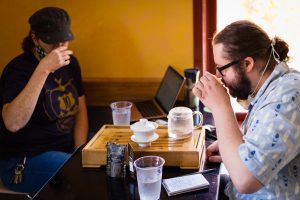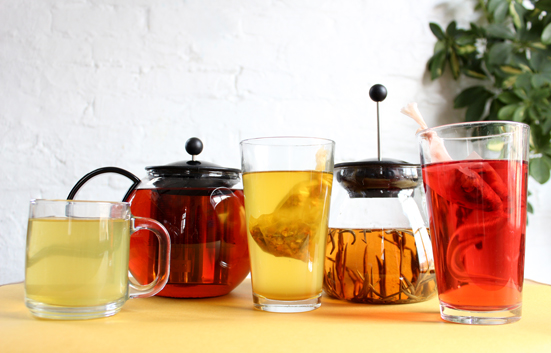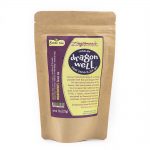A vision is realized with an increased selection of tea
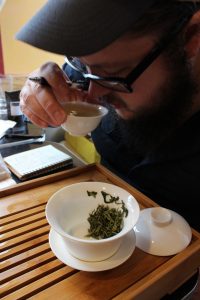 by Jackson Konwinski, Zingerman’s Delicatessen Tea Buyer/Specialty Foods Supervisor
by Jackson Konwinski, Zingerman’s Delicatessen Tea Buyer/Specialty Foods Supervisor
Our new selection of tea goes out to all you leaf lovers out there–the regulars who have been with us for decades, the first-timers looking for something special, and everyone else who will walk through our door someday in search of great tea.
I’m excited to introduce an expanded selection of tea at Zingerman’s Deli. What began as a vision in late Summer 2019, has come to fruition this holiday season despite a very interesting 2020. Driven by my passion for tea and guided by the mantra of traditionally made and full flavored, I endeavored to expand our selection of tea. We brought back long lost favorites and added new representations of the great styles of tea from around the world. We tasted over a hundred different teas in our efforts developing our new collection. While I can’t say we’re 100% of the way there, I can say with confidence that we have the best selection of teas and tisanes we’ve ever offered at the Deli.
We are still proud to offer a wide selection of teas from Rishi (many of which are served in the Next Door Cafe), but are now excited about the new partnerships we’ve made with Silk Road, teapigs, Camellia Sinensis and Adagio. In addition, we are delighted to bring you a curated selection of our very own Zingerman’s Deli tea. What follows are some highlights of our newest offerings. I hope you enjoy them as much as I do.
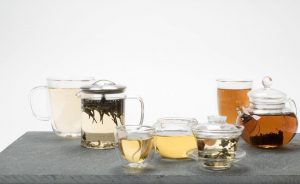
New selection of tea from our friends at Camellia Sinensis in Montreal:
- Maple Tea – Nilgiri Coonoor black tea from their own tea factory in India blended with Quebec maple sugar. Good plain, even better steeped extra strong with milk or your plant milk of choice.
- Eva Chai – A green tea chai with turmeric, green cardamom, and ginger. Amazing with coconut milk. All the tea and spices are sourced organically in India.
- Winston Chai – A black tea chai with black cardamom and chicory root. More earthy and smoky than the classic Masala Chai. Like the Eva, all the ingredients are organically grown in India.
- Assam Banaspaty – A classic, robust Assam from a great organic tea garden. Slightly milled, this tea is another breakfast-style staple that is yummy with or without milk.
- PuEr Jingmai 2008 – A shou or ‘ripe’ pu-erh (puer or pu’er) from Jingmai Mountain in Yunnan province. This is the same style as our Zingerman’s Pu-erh Tuo Cha or Rishi’s Pu’er Classic but aged much longer, allowing it to mellow and develop.
- Genmaicha – Lovely, savory green tea with toasted and puffed rice. Delightful with food or just because. Distinctly more seaweed-forward than the Silk Road Genmaicha sachets we also have on our shelves.
- Gyokuro Shizuoka – A classic shade-grown “Jade Dew” from a farmer cooperative in Shizuoka. Savory, fruity, delicate, and just plain delicious.
- Yerba Mate – A really nice organic, fair trade Brasilian yerba mate in a 1-pound loose leaf bag. This tea is sourced by Camellia Sinensis brand, but packaged under the Chá Mate Triunfo brand of Brazil.
> SHOP CAMELLIA SINENSIS TEAS ONLINE AT THE DELI
New packaged selection of tea from Adagio’s Masters’ Collection:
- Yunnan Golden Curls – A high end golden tip tea from Yunnan that is rich and spicy. It’s in the same family as Rishi’s Golden Yunnan, but has a more distinctive flavor profile. It’s a lot more golden, and the leaves have been rolled into small curls. The nose has raisins and spice, the body is robust, and despite its classic, malty profile, it has a wonderful floral top note that is positively delightful. I ordered it in cute little 1-ounce tins so it’s more affordable.
- Meng Ding Huang Ya – Our first ever Yellow Tea! The name literally means “Misty Peak Yellow Tea.” This is also our only tea (currently) from Sichuan Province. A style of tea that is closely related to green teas, yellow tea has some extra processing steps. It’s made from hand-plucked buds from 30-year-old tea trees that are withered, fired four times, and slightly fermented by a process called “sweltering”. The taste is on the roasty or nutty side.
> SHOP ADAGIO TEA ONLINE AT THE DELI
And here they are, our all-star cast of new Zingerman’s teas!
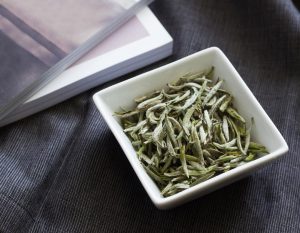
White Tea
- White Peony – A classic and simple white tea made from buds and leaves that have been withered and dried. White peony is defined by how little it’s processed. While the skill of the teamaker is still very important, it’s really about showcasing the quality of the tea itself. This selection is made from the same local tea plant cultivar as our Golden Eyebrow.
- Silver Needle – An iconic white tea from Fujian province made from downy buds plucked in the early spring. This is a very tasty, everyday silver needle. It is not a super-high end bai hao yin zhen or jingning yin zhen but it’s much better than most and it’s more affordable. And did I mention it’s really yummy?
- Jasmine Silver Needle – My favorite jasmine tea. And it’s just what it sounds like – downy silver needles scented with jasmine blossoms. White tea is harder to oversteep than green tea so this one stays super mellow, sweet and floral even if you forget about it for a little while.
- Nan Mei – Sometimes called Ya bao, this is a truly unique type of white tea. In basically all other cases, when a tea bud is picked, the bud is going to grow and become a leaf. For Nan Mei, the bud would have eventually become a branch. The buds are withered and lightly fired after being foraged. This white tea is arguably a tisane because the wild tea trees it comes from are so genetically different from ‘normal’ tea plants.
> SHOP WHITE TEA ONLINE AT THE DELI
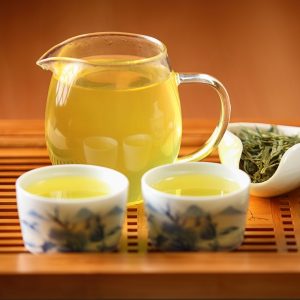
Green Tea
- Jasmine Pearls – We have a new source for our hand-rolled, Jasmine scented green tea pearls. If you were a fan of the tinned Rishi Jasmine Pearls, never fear, they are still available brewed to order in the Next Door Café.
- Viridian Mist – This tea is similar to a tea called Jade Cloud we used to carry at the Deli. The Viridian Mist isa triple style green tea blend (steamed, panned, baked) that is sourced from different farms in Fujian Province. I find it a little sweet. But really, you’re going to buy it just for the platypus on the package.
- Daily Dragon Well – A lower grade (smaller leaves, more slightly broken leaves), more local style dragonwell from the traditional provincial origin. It’s still nutty and yummy, just not quite as nuanced, complex, and special as a first grade. If you love Dragon Well, you can order a high-grade version brewed to order in the Next Door Café. And stay tuned–’m hoping to bring in a high-grade special batch for you to brew at home in Spring 2021.
- Hojicha – A traditional Japanese green tea made from roasted leaves and stems. It’s often offered after a meal and happens to be one of my personal favorites that I have missed dearly. I am so glad it is back on our shelves!
- Moroccan Mint – A traditional style tea made from Chinese Gunpowder green tea and peppermint. The mint is farmed in the Pacific Northwest and the gunpowder is a loosely rolled style that prevent it from being too bitter. One point to confuse you: this is a different tea from the Moroccan Mint (from Rishi) that the Next Door serves which is a jasmine-scented green tea blended with mint. Both are delicious!
- Kamairicha – An anomaly in the world of Japanese green tea. Unlike virtually all Japanese greens, this one that comes from the island of Kyushu is pan-fired like many Chinese green teas. Flavorwise, it starts fruity and mild and gets kind of tropical as it cools.
- Gunpowder Green – A classic and well-known style of green tea. Our selection is the loosely rolled style, just like in the Moroccan Mint. It’s robust and sweet and produces a silky mouthfeel.
> SHOP GREEN TEA ONLINE AT THE DELI
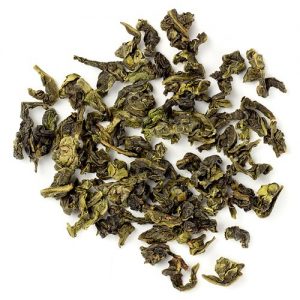
Oolong Tea
- Iron Goddess – The iconic rolled oolong style from AnXi Province, China. This tea was harvested in the spring of 2020 and is a more oxidized, roasted style. It’s quite traditional for the style and just a great everyday tea. This is different from the Iron Goddess served in the Next Door (though they are similar and both delicious).
- GABA Oolong – A leafy oolong style that is a modern invention from Taiwan. The production process involves multiple rounds of vacuum sealing the tea at warm temperatures to help production of GABA. This was originally developed as a health supplement to deliver GABA molecules, an important part of neurotransmitter function (read about GABA here). I brought it in because it tastes INCREDIBLE.
- Milk Oolong – Another modern oolong style from Taiwan. It’s a cultivar called Jin Shuan or Golden Lily but gets its colloquial name because it has a milky aroma, a slightly lactic taste, and a creamier mouthfeel. It’s rolled in the Tieguanyin/Iron Goddess style but from larger leaves and buds on the greener, less oxidized and roasted side.
- Wuyi Yan Cha – Literally “rock tea”, this is a traditional leafy oolong style from the Wuyi mountains of Fujian Province, China. The tea is named for the plants that grow on rocky hillsides digging their roots in the cracks. Most of these teas have special names that describe their aroma. In this case, our selection is translated as “Scent of Daphne” because of its similarity to the smell of daphne blossoms (also known as laurel or bay leaves).
- Ben Shan Oolong – A Tieguanyin style rolled oolong made from Ben Shan cultivar tea bushes grown in the Minn Nan area of Fujian Province. Unlike the Iron Goddess, this tea is verdant and pungently floral. It smells like lilies and orchids when you brew it.
- Dong Ding Roasted Oolong – Yet another show-stopper from Taiwan. A rolled oolong that is deeply oxidized and roasted. But somehow, it smells like fresh berries on the first steeping. Dong Ding (sometimes “Tung Ting”) means “Frozen Peak”. It’s not a strangely poetic reference, it’s just the name of the mountain on which the tea garden is located. This particular garden is a small labor of love in Lugu Township, a place that is famous for its yearly oolong competitions with thousands of entrants.
- Phoenix Mountain Dan Cong: Magnolia Blossom – Another more rare style of oolong tea from Guangdong Province. Like the “Rock Teas”, this is a more oxidized, unrolled leaf that is named for a flower its aroma resembles. This is a complex tea that evolves with every steep.
> SHOP OOLONG TEA ONLINE AT THE DELI
Black Tea
- Golden Eyebrow – A golden black tea made from small, spring plucked leaves rolled into fine eyebrows. Our selection is from the Fu An area of Fujian Province. It tastes like malted grain and burnt sugar, but really has a wonderful, persistent sweetness. It’s a phenomenal iced tea as well.
- Darjeeling First Flush – This year’s pick comes from Jungpana, a tea garden that has been around for about a century in Darjeeling. Everything they grow is organic. This year’s selection comes from their high mountain tea gardens. It’s on the green end of a black tea and smells just like fresh raspberries on the first steeping. The second infusion goes more to the classic, malty Darjeeling side.
> SHOP BLACK TEA ONLINE AT THE DELI
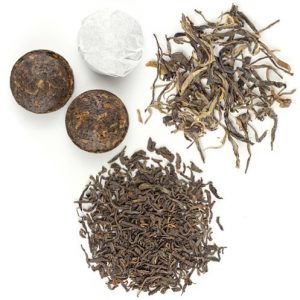
Pu-Erh Tea
- Farmhouse Pu-Erh – A cake-pressed, sheng or ‘raw’ style pu-erh. This is the older, more traditional style that we haven’t carried before. This particular one is from a newer, organic tea garden in Yunnan that is vertically integrated from leaf to final tea. This is a 2019 harvest.
- Mountain Pu-Erh – Another cake-pressed, sheng pu-erh but this is one is a 2016 harvest from Mengsong Mountain in Yunnan. It’s more intense, complex, and leathery.
- Grand Reserve Pu-Erh – A loose leaf sheng pu-erh produced in the fall of 2002 in Yunnan from the traditional Da Ye cultivar (said to be one of the oldest tea varietals still in use). It has been carefully matured in Hong Kong wet storage for nearly 2 decades. Similar to other aged products (think scotch), this tea is expensive, spectacular, and well worth the wait.
- Pu-Erh Tuo Cha with Chrysanthemum – Making a triumphant return to our Deli shelves! A yummy shou or ‘ripe’ pu-erh pressed into little tuos or ‘nests’ with dried chrysanthemum blossoms. Our selection comes from a farm in Cangyuan County in Yunnan Province. Funky, floral, spicy, yet somehow cooling. Another personal favorite!
> SHOP PU-EHR TEA ONLINE AT THE DELI
Thank you
This collection has truly been a labor of love for me. I would be remiss if I did not appreciate the tireless work of Fielding, my coworker in our Merchandising Department. His graphical design work adorns the front of every new Zingerman’s tea we’re introducing this year– none of this would be possible without him. Thank you Field for being a partner on this journey, for dealing with my mistakes and my seeming inability to ever get the copy correct the first time. And thank you to everyone else who’s helped make this possible and helped me along the way. There are miles still to go and roads still untravelled but I’d like to invite everyone along for the adventure.
And thank you, dear reader, for your dedication. I would like to extend a personal invitation to explore the full collection in person, online, or over the phone. I can’t wait to help you fall in love with tea all over again.
-Jackson

